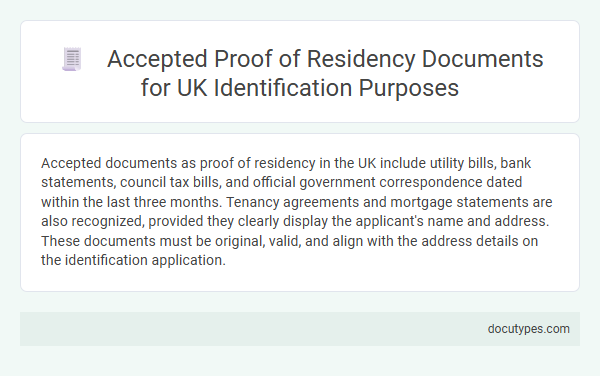Accepted documents as proof of residency in the UK include utility bills, bank statements, council tax bills, and official government correspondence dated within the last three months. Tenancy agreements and mortgage statements are also recognized, provided they clearly display the applicant's name and address. These documents must be original, valid, and align with the address details on the identification application.
Overview of Proof of Residency Requirements in the UK
Proof of residency in the UK is required to verify an individual's residential address for various legal and administrative purposes. Accepted documents typically include utility bills, council tax statements, bank or credit card statements, and official government correspondence dated within the last three to six months. These documents must clearly display the applicant's name and current UK address to meet the residency verification standards set by authorities.
Why Proof of Residency is Necessary for Identification
Proof of residency is essential for verifying an individual's current address and establishing their identity within the UK. It supports access to services, legal processes, and eligibility for various benefits by confirming where a person lives.
Accepted documents as proof of residency in the UK include recent utility bills, council tax statements, and bank statements dated within the last three months. Official government correspondence, rental agreements, and NHS registration letters are also valid forms of identification for residency verification.
Government-Issued Documents Accepted as Proof of Residency
Government-issued documents are widely accepted as valid proof of residency in the UK. These documents provide official confirmation of an individual's residential address and identity.
- UK Driving Licence - Issued by the DVLA, displaying the holder's current UK address.
- Council Tax Bill - An official yearly statement reflecting property residency for tax purposes.
- Utility Bills - Gas, electricity, or water bills issued within the last three months with the resident's name and address.
Utility Bills as Valid Proof of Address
Utility bills are widely accepted as valid proof of residency in the UK. Documents such as gas, water, electricity, or landline phone bills serve as reliable evidence of your address.
These bills must be recent, typically dated within the last three months, to meet official verification standards. Accepted utility bills help confirm residency for purposes like opening bank accounts or applying for government services.
Financial Statements and Bank Documents
Proof of residency in the UK can be demonstrated using various financial statements and bank documents. These documents verify your address and are widely accepted in official processes.
Bank statements issued within the last three months showing your name and current address are commonly accepted. Financial statements such as mortgage statements, council tax bills, or utility bills linked to your bank account also serve as valid proof. Ensure that the documents are original or certified copies for them to be accepted.
Tenancy Agreements and Mortgage Statements
Proof of residency in the UK is essential for various official processes and verification purposes. Tenancy agreements and mortgage statements are commonly accepted documents that confirm an individual's residential address.
- Tenancy Agreements - A legally binding contract between a landlord and tenant, detailing the rental property's address and tenancy duration.
- Mortgage Statements - Official documents issued by a mortgage lender showing property ownership and the borrower's address.
- Document Requirements - Both tenancy agreements and mortgage statements must be current, dated within the last three months, and include the resident's full name and address.
These documents provide reliable evidence of residency when applying for services or verifying identity in the UK.
Official Correspondence from Government Departments
Official correspondence from UK government departments serves as valid proof of residency for identity verification and administrative purposes. Such documents must clearly display the applicant's name and address to be accepted.
- HM Revenue and Customs (HMRC) Letters - Official letters from HMRC regarding tax codes, tax returns, or National Insurance contributions are accepted proof of UK residency.
- Department for Work and Pensions (DWP) Correspondence - Statements or notifications from DWP about benefits, pensions, or Universal Credit confirm residency status.
- Local Council Communications - Documents like council tax bills or official notifications from local government offices verifying residency are recognized as valid proof.
Educational Institution Letters as Residency Proof
Educational institution letters are widely accepted as valid proof of residency in the UK, especially for students. These letters must be official, include the institution's letterhead, and clearly state the student's address. Many government agencies and service providers recognize these documents for residency verification purposes.
Healthcare Documents Recognized for Residency Verification
| Document Type | Description | Usage in Residency Verification |
|---|---|---|
| NHS Registration Letter | Official letter confirming registration with a General Practitioner (GP) within the UK healthcare system. | Accepted as proof of residency due to its link to a fixed address and active healthcare engagement. |
| Hospital Appointment Letter | Document confirming a scheduled outpatient or inpatient appointment at a UK hospital or clinic. | Used to verify residency by demonstrating regular medical appointments associated with a UK address. |
| Prescription Receipt | Official pharmacy receipt or label showing medication dispensed by the NHS tied to a patient's UK address. | Supports residency verification by confirming ongoing NHS treatment at a specified UK location. |
| Summary Care Record | Digital record containing basic medical information accessible by authorised NHS staff, linked to patient's UK address. | Referenced to confirm residency when other physical documents are unavailable, due to its authoritative NHS data source. |
| Community Health Services Letter | Official communication from community health services such as district nursing or health visitor programs. | Admissible as proof of residency because it evidences health services delivered at a UK residential address. |
Which Documents Are Accepted as Proof of Residency in the UK? Infographic

